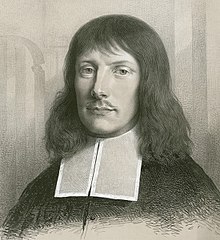Herr Gott, Beherrscher aller Dinge, BWV 120a
|
Herr Gott, Beherrscher aller Dinge BWV 120a |
|
|---|---|
| Wedding cantata by J. S. Bach | |

Joachim Neander, author of the chorale text
|
Herr Gott, Beherrscher aller Dinge (Lord God, ruler of all things),BWV 120a, is a wedding cantata by Johann Sebastian Bach. He composed and first performed it in Leipzig, most likely in 1729.
Bach composed the cantata for a wedding in Leipzig probably in 1729, "in great haste", according to Klaus Hofmann, looking at Bach's handwriting and mistakes made by the copiers. Only the vocal parts, a viola part and three continuo parts are extant. As the cantata shares music with other works, particularly BWV 120, but also BWV 1006 and BWV 137, it can be reconstructed. The names of bride and groom are not known. He has been assumed to be a minister, deducted from the text "Herr, fange an, und gib den Segen / auf dieses deines Dieners Haus" (Lord, begin and pronounce your blessing / on this, your servant's house).
The text was written by an anonymous poet. It is in two parts, the second one marked Post copulationem (after the wedding ceremony). The closing chorale is by Joachim Neander, stanzas 4 and 5 of his hymn "Lobe den Herren, den mächtigen König der Ehren".
The piece is scored for four solo voices (soprano, alto, tenor, and bass) and a four-part choir, three trumpets, timpani, two oboes, two oboes d'amore, two violins, viola, and basso continuo.
...
Wikipedia
